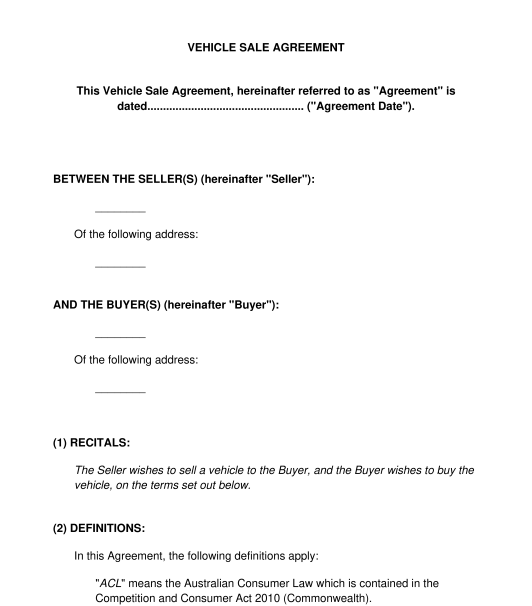 01/10/2025
01/10/2025

Answer a few questions and your document is created automatically.

Your document is ready! You will receive it in Word and PDF formats. You will be able to modify it.

 01/10/2025
01/10/2025
 Word and PDF
Word and PDF
 14 to 19 pages
14 to 19 pages



A Vehicle Sale Agreement is a document that can be used to lay out the details of the sale of a vehicle from a Seller to a Buyer. Using this Agreement, the Buyer and Seller can outline the terms and conditions of the sale and describe the vehicle that is being sold. This document can be used to sell many different kinds of vehicle, including cars, vans, trucks, motorcycles, and boats.
This Agreement may be adapted for use by private sellers (for example, an individual person selling his or her motorbike on Gumtree), or by businesses (such as a used car yard).
This document can be used to sell many different kinds of vehicle, including cars, vans, trucks, motorcycles, and boats.
On the other hand, we also have a Contract for Sale of Goods which is a more generic agreement and can be used for selling a wide range of other goods such as equipment, machinery, furniture or electronic goods.
Our Vehicle Sale Agreement is more tailored for vehicle sales - and includes space to include details such as registration numbers, VIN numbers, odometer readings and other similar relevant information.
No, it is not mandatory to have a written Vehicle Sale Agreement. However, it is highly recommended to have one, as a written agreement can help ensure that both parties are on the same page regarding the transaction. It also protects both parties' interests in case there is some kind of dispute or disagreement regarding the vehicle sale.
The Vehicle Identification Number or VIN is a unique number assigned to each vehicle. It can apply to various kinds of vehicles such as motorcycles, cars or vans. The VIN is located in a number of places on a vehicle, but most commonly on the dashboard (it can be seen through the windshield) and the driver's side door jamb sticker. On some vehicles the VIN is also placed on the engine, bonnet, and other parts. On motorcyles is may appear on the steering neck or on the motor, near the bottom of the cylinders. The VIN may also appear on title documents, insurance policies, service records and police reports for the vehicle.
A Hull Identification Number or HIN is a number assigned to each boat or watercraft. Each HIN is unique to a specific boat and is the same as the VIN on a motor vehicle. All boats manufactured after 1972 have a HIN consisting of 12 characters which are marked on the hull of the boat.
Before purchasing a vehicle, it is recommended that the buyer conducts some due diligence. This could include having it inspected by a mechanic, checking the Personal Property Securities Register to see if there are any loans secured against the vehicle or if the vehicle has been stolen or written off, or checking with the relevant state or territory transport authority to confirm that the seller is actually the registered owner of the vehicle.
Once this agreement is ready, the buyer and seller should review it to make sure they are happy with it, and then sign it and date it.
The parties should then save a copy of the signed version for their own records. If the agreement includes a cooling off period, then the parties may need to wait until that period expires before proceeding any further. If the agreement includes other provisions such as an opportunity for the buyer to have the vehicle inspected by a mechanic, or to obtain a loan to pay for the vehicle, then these things should be dealt with before the transaction is finalised. Both parties should make sure their insurance is up to date, and the buyer should make sure to organise insurance for the vehicle before actually picking the vehicle up from the seller.
Once the parties are ready to finalise the transaction, the buyer will need to pay the purchase money to the seller. The seller should also make sure to hand over all keys for the vehicle. Once a vehicle has been purchased in Australia, both parties need to submit documents with the relevant government office in their state or territory within a designated timeframe. The buyer will also need to pay stamp duty and relevant transfer fees, which vary between jurisdictions and depend on the size, value and category of the vehicle.
A Vehicle Sale Agreement should contain the relevant details of the transaction, including:
Vehicle Sale Agreements in Australia are subject to general principles of contract law.
If a vehicle is being sold by a business, to an individual consumer, then the Australian Consumer Law which is set out in the Competition and Consumer Act 2010 (Commonwealth), may also be relevant.
Importantly, if the Australian Consumer Law applies, and if the seller is providing any warranties against defects in relation to the vehicle, then the Australian Consumer Law requires these warranties to be presented in a certain way, and to include certain information. There are penalties for failure to do this. If in doubt, seek legal advice.
Sale of Goods legislation or Vehicle Sale legislation in the relevant state or territory may also apply.
You fill out a form. The document is created before your eyes as you respond to the questions.
At the end, you receive it in Word and PDF formats. You can modify it and reuse it.
Guides to help you
Vehicle Sale Agreement - sample template - Word and PDF
Country: Australia